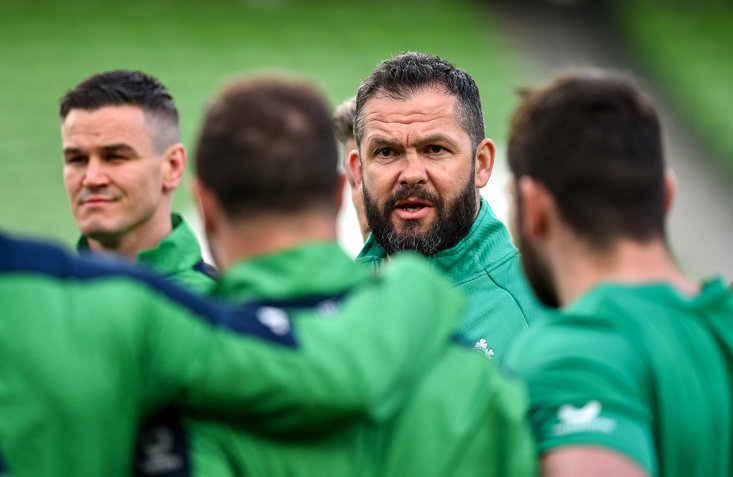In 2018, Ireland were almost untouchable. They started their season with an away win in Paris in the opening round of the Six Nations, clinching the match in the third minute of overtime, after 41 phases, with a drop goal from 45m out. A Grand Slam, a first series victory in Australia for 39 years, and a convincing autumn victory over New Zealand followed. Nothing could stop them. Self-belief: thy name is Ireland.
They opened their Six Nations campaign in 2019 widely considered to be the best team in the world. Seemingly filled with confidence, they began the defence of their title at home to England, who had struggled for most of the previous year. The battering, literal and metaphorical, that they took from England took away the breath of spectators as well as players. As the tournament went on, Ireland couldn’t recover, bookending the competition with another hammering away to Wales.
Their form continued to be patchy, even ignoring the World Cup warmup games. Their victory over Scotland in the opening round of the World Cup felt comprehensive but they struggled to impress after that, with humbling defeats at the hands of first Japan and then New Zealand.
The simple summary of all that is that, in 2018, Ireland were filled with self-belief. In 2019, it was knocked out of them and they couldn’t get it back.
But that’s far too simple a diagnosis for sport at this level.
Injuries played a part, with the outstanding Dan Leavy being particularly missed for his work at the breakdown — essential to Ireland’s possession-based game. And the form of half-back pairing Conor Murray and Jonathan Sexton, imperious in 2018, tailed off badly.
Luck plays a role in all these things, of course. That’s why coaches talk about “fine margins”. It’s not just an excuse: the breeze catching your kick a little better or worse can easily be the difference between a win or a loss, a different angle on the camera could change the TMO decision, a freak accident can rid you of your best player.

When people say “you make your own luck”, what they really mean is that you give yourself enough breathing room that bad luck doesn’t derail you. You score enough points that one referee decision doesn’t cost you the game, you have enough depth that one player doesn’t destroy your plans, and so on. In 2018, Ireland seemed to be on the right side of that “lucky” divide; in 2019, they weren’t.
Interestingly, from the summer of 2014 to the final pre-RWC warmup game, Ireland didn’t win a match after being behind at half-time. Start well and they could see a game out, go behind and they could never quite catch up.
But there is more to it than that. Sexton didn’t score that drop goal in 2018 because he got lucky, he managed it because he had successfully bossed his team through 41 phases of possession without a single mistake. That takes a huge amount of technical ability as well as belief in the system and the team. Throughout 2019, Sexton was visibly trying to do the same thing but it wasn’t coming off.
One thing that didn’t change between 2018 and 2019 was Ireland’s head coach, Joe Schmidt, undoubtedly the most successful Ireland coach of the modern era — arguably, ever. Those who have worked with Schmidt have spoken repeatedly about the huge respect they hold him in, how he improved their individual games as well as the team’s results.
But they also talk about how exhausting his approach was, how specific his demands were, how they dreaded video analysis after a match. Nobody wants to take away from Schmidt’s superb achievements but the feeling does seem to be that he had depleted their mental reserves after six years of his exacting methods. Paradoxically, his continued presence might have been the reason behind the change in Ireland’s form.
His replacement, Andy Farrell, has a reputation as no-nonsense leader of men and was part of Schmidt’s staff from 2016. However, he has pointedly taken a lighter approach, suggesting there is merit to this assessment of Ireland’s 2019 experience. The team were underwhelming in their opening fixture of the 2020 Six Nations but Farrell praised the way they had stuck at their task rather than highlight the failings. His habit of playing music in training sounds trite but breaking with the previous regime and lightening the mood in camp appears to be working, as players have reported.
Self-belief, like luck, is too simplistic a metric to reduce elite sports performance down to. But sports teams are made up of humans so of course it plays a part, as does positivity throughout the camp. Farrell seems to intuitively understand that and has taken steps to put that one piece of the puzzle into place up front, allowing him to get to work on the other details needed to return Ireland to their previous achievements.